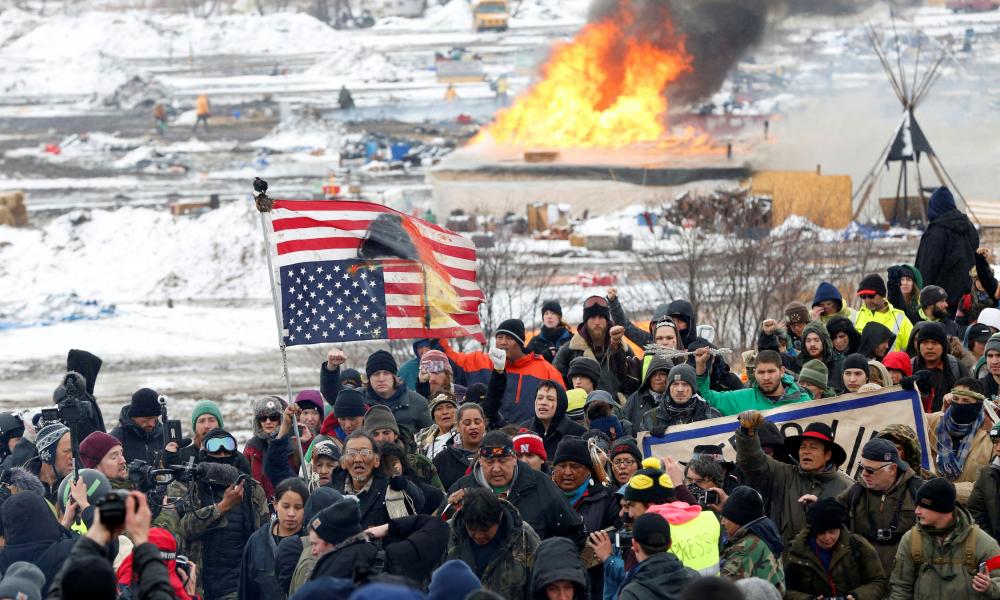
More than half the jurors selected to hear a case brought by a major energy company against Greenpeace have ties to the fossil fuel industry, and most had negative views of anti-pipeline protests or groups that oppose the use of fossil fuels.
The closely watched trial against Greenpeace in Mandan, North Dakota, showcased the difficulty in seating a jury in oil country, where many make their living in the industry. Greenpeace again on Wednesday sought to move the trial to another venue in the state.
Energy Transfer Partners, a Dallas-based oil-and-gas company worth almost $70bn, has accused Greenpeace of defamation and orchestrating criminal behavior during the area’s Dakota Access pipeline protests in 2016 and 2017. It is seeking $300m in damages, which Greenpeace says could bankrupt its US operation.
Advertisement
Advertisement
Opening statements began on Wednesday in the case, which is expected to run for five weeks. In his opening, Energy Transfer’s attorney said he would prove his allegations that Greenpeace coordinated actions against the pipeline and defamed Energy Transfer, according to the Associated Press.
“They didn’t think that there would ever be a day of reckoning, but that day of reckoning begins today,” said Trey Cox, according to the AP.
Greenpeace, in its opening, said there was no evidence to back up these claims.
Dozens of potential jurors in an initial pool of about 100, which was whittled down to the final 11 by lawyers from both sides and by the judge, said they held negative views of the pipeline protests.
Advertisement
Advertisement
They used terms like “scary”, “chaos”, “destruction”, “disturbance” and “atrocities” to describe the protests and what the local area was left to clean up afterward. One said he was against protesting in general, saying he found it “kind of dumb”.
Greenpeace challenged nearly all potential jurors, trying to get the judge to agree they were too biased or had too many ties to the issue. In some instances, Greenpeace succeeded. On further direct questioning of individual jurors, some admitted they would struggle to be impartial toward Greenpeace or about the protests. Others insisted they would be able to assess the evidence objectively.
Pipelines are “what keeps this country alive”, one potential juror who worked at a gas company said. He was excused by the judge.
More in U.S.
One man said he had a friend in the national guard who had responded to the protests, and he had heard his stories about what the friend saw. When asked by Greenpeace whether he could ignore what he’d heard before and focus solely on what was introduced in the case, the man noted how difficult that would be. “Wouldn’t that be impossible? I think that’d be very hard,” he said. He also did not make it into the final jury pool.
Advertisement
Advertisement
Many potential jurors worked directly in the fossil fuel industry, a major employer in western North Dakota, or had close family members who worked in the industry. Some worked at local refineries or energy companies. Others receive money from oil wells on their or their family’s properties. They said they believed the industry was beneficial to them and the broader community, and they didn’t know how they would make money without it.
One said that without fossil fuels, he would be “out on the streets”. The man is now on the jury.
Another woman who made it onto the jury admitted she was very easily swayed by others because “people are very convincing”.
“It’s inconceivable that this jury could do anything other than ultimately enter a judgment on behalf of the plaintiff,” said Marty Garbus, a longtime trial attorney who is part of a trial-monitoring committee attending the trial. The group, made up of prominent civil rights attorneys and advocates, will observe the trial and have expressed concerns about judicial bias and violations of due process.
Advertisement
Advertisement
Greenpeace filed a petition to the North Dakota supreme court on Wednesday to change the venue for the case. The county court where the case is being heard has denied three prior motions for change of venue.
Daniel Simons, senior legal counsel for Greenpeace International, said the organization has argued from the beginning that the case should be heard away from where the events happened, and is asking the high court to “relieve the local community from the burden of this case and ensure the fairness of the trial cannot be questioned”.
Related: Fossil fuel firm’s $300m trial against Greenpeace to begin: ‘Weaponizing the judicial system’
Separately, the county court judge, James Gion, has denied requests to livestream the proceedings, claiming it would interfere with Energy Transfer’s right to a fair trail.
Advertisement
Advertisement
The group of trial monitors filed a petition on Wednesday to the North Dakota supreme court urging it to mandate a public livestream, saying a case of such broad national and international consequence calls for more public access.
The cadre of attorneys on hand for the trial underscores the importance of the case and is a departure from the norm for the small-town court. Greenpeace leaders from around the world were also in the courthouse this week to watch the case.
In recent weeks, mysterious rightwing mailers have arrived at the homes of local residents that Greenpeace alleged could further taint the jury pool. The mailers, made to look like a newspaper and titled Central ND News, contain “articles” slanted against the pipeline protest or in favor of Energy Transfer, among stories about immigration and community news.
Everett Jack, an attorney representing Greenpeace, held the mailers up during jury questioning on Monday, asking potential jurors whether they’d had any arrive at their homes. Few recognized the mailer, but one man said he not only recognized it, but had brought a copy to the courthouse that day because it was related to the case.
EMEA Tribune is not involved in this news article, it is taken from our partners and or from the News Agencies. Copyright and Credit go to the News Agencies, email news@emeatribune.com Follow our WhatsApp verified Channel




